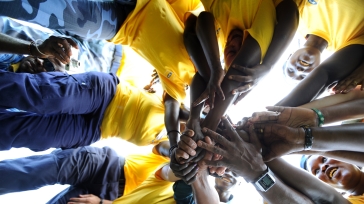Publications
September 2015
-

Publication
HIV Prevention, Care and Treatment at Work in Indonesia
21 September 2015
As one of the biggest state-owned enterprises in Indonesia, with more than 14,000 workers and 25,000 subcontracted workers throughout Indonesia (of which 40 per cent are mobile male workers), Pertamina has shown a serious and consistent commitment to the prevention of HIV and AIDS at the workplace and to the fight against stigma and discrimination. Pertamina has developed workplace policies to ensure a non-discriminatory working environment for People Living with HIV (PLHIV) and has provided HIV information, counselling and testing for its workers in their sites across the country.
-

Publication
Preventing HIV in Ethiopia: The Mulu Worksites Project
21 September 2015
The MULU Worksites project is a USAID/PEPFAR-funded project managed by World Learning Ethiopia in partnership with FHI 360, Population Service International (PSI), and the International Labour Organization (ILO). The project seeks to implement gender-responsive workplace HIV combination prevention programmes that will strengthen the HIV response in large-scale workplaces employing over 500 persons. The construction, agriculture, leather, cement, mining and manufacturing sectors are a vital entry point for combination prevention, as they employ women and men engaged in high-risk behaviours such as commercial and transactional sex, and multiple concurrent partnerships.
-

Publication
Reducing HIV Vulnerability in Zambia through economic empowerment
21 September 2015
To create gainful employment as an avenue for economic empowerment and, eventually, to reduce vulnerability to HIV and AIDS, the International Labour Organization (ILO) signed and ratified a Corridor Economic Empowerment Innovation Fund (CEEIF) grant with Cavmont Bank in Zambia, kick-starting a public-private partnership in Zambia. The project is linked to the ILO’s Corridor Economic Empowerment Project (CEEP) to reduce HIV vulnerability along the main transport corridors in Southern Africa.
June 2015
-
Publication
The ILO and the European Year for Development - Factsheet
08 June 2015
With more than 150 joint projects over the past 10 years, the European Year for Development (2015) offers a perfect opportunity for the ILO and the EU to showcase the human impact these efforts have had on millions of lives – in all corners of the world. Each month of the year is devoted to a different theme.
May 2015
-

© AFP/P. Lopez 2024
Publication
The ILO Response to the Nepal Earthquake
07 May 2015
Following the worst earthquake in Nepal over the last 80 years, there is an urgent demand for assistance to poor households to help them rebuild their lives. This includes support to rebuilding infrastructure as well as securing poor households with income – through employment opportunities created by reconstruction efforts. The ILO has been asked by the Government of Nepal to contribute to such efforts.
April 2015
-

Publication
Key ILO databases and sources: An overview for the private sector
15 April 2015
Covers the main issues with which companies may wish to familiarize themselves using the ILO’s comparative databases and research
-

Publication
Mainstreaming the strategic objectives of the Decent Work Agenda in UNDAFs and UN Joint Programming (2013-2015)
15 April 2015
The present desk review has been prepared in response to the need for greater UN system-wide policy coherence in development cooperation and country-level operational modalities established and/or recommended by the Quadrennial Comprehensive Policy Review of the United Nations (December 2012). This study analysed in a qualitative manner the mainstreaming of the Decent Work Agenda in the UNDAFs and One Programmes in a sample of 43 countries from five regions over the period January 2013 to March 2015 (active UNDAFs). The review illustrates how the efforts in joint programming are aligned and reflected in the activities and results of 95 components which have been implemented by the ILO in the framework of 15 joint programmes.
March 2015
-

Brochure
The Fair recruitment initiative
30 March 2015
Fostering Fair Recruitment Practices, Preventing Human Trafficking and Reducing the Costs of Labour Migration
January 2015
-

Publication
South-South and Triangular Cooperation and Decent Work: Focus on Triangular Cooperation
11 January 2015
An introductory fact sheet
October 2014
-

South-South and triangular cooperation
BRICS and the ILO: An overview
16 October 2014
During the past few years, development cooperation between both governments and private industry from the BRICS countries (Brazil, Russian Federation, India, China, South Africa) and the ILO has been very active. In 2009, Brazil signed an overarching framework agreement on Technical Cooperation with Latin American and African countries for the implementation of the ILO-Brazil Partnership Programme for the Promotion of South-South Cooperation.
-

Publication
Strengthening the world of work response to HIV and AIDS: Public-Private Partnership
09 October 2014
The ILO is the lead UN agency for HIV and AIDS policies and programmes in the world of work and private sector mobilization. The ILO programme on HIV and AIDS and the World of Work plays a key role in the global HIV responses through workplaces.
September 2014
-

South-South and Triangular Cooperation
How-To Guide: SSTC and Decent Work
21 September 2014
In line with the strategy of the ILO for South-South and triangular cooperation and its outcomes, this How-to Guide aims at helping practitioners better understand South-South and triangular cooperation. It is mainly targeted at the United Nations system and the ILO’s tripartite constituency, with a focus on the staff who will be applying this tool in their operational programmes.
July 2014
-

Publication
The Taqeem Fund: Results-based monitoring and evaluation for youth employment in the MENA region: Public-Private Partnership
26 July 2014
To support youth employment initiatives and improving the effectiveness of their programs, the ILO initiated work on results-based monitoring and evaluation. This new public-private partnership (PPP) supports a select group of small and medium-sized youth employment organizations from the Middle East and North Africa region to develop strategies and provide evidence of their impact, through cost-effective and mass-market technology-based tools. The results are promoted to a broader community of policymakers, practitioners and funders. The Taqeem (wich means “evaluation” in Arabic) Community of Practice (CoP) is a group of fifteen youth employment organizations pioneering new approaches to build capacity in the MENA region to measure and monitor the impact of national programmes.
June 2014
-

Publication
The Microinsurance Innovation Facility: Catalyzing protection of the working poor
17 June 2014
The Facility inspires and encourages new approaches to reach unmet needs and thus stimulates product and process innovations within potential and existing risk carriers, but also the types of services offered and the delivery channels chosen. Such innovations can fall within the entire range of operations; they can be related to, for example, the client interface, the processing of applications, the claims and the renewals.
-

Publication
Factsheet: ILO in fragile situations
06 June 2014
Working in partnership with countries in fragile situations is a priority for the ILO. The significance of Decent Work for peacebuilding and recovery has been highlighted through recent initiatives such as the conclusion of the New Deal for Engagement in Fragile States. Over the past decade the ILO has been active in more than 38 fragile and conflict-affected states including all of the 18 member countries of the g7+ group. This factsheet offers key background information on the ILO's work in such situations, focusing on major recent programmes that have helped transform countries recovering from extreme hardship into resilient and functioning States.
May 2014
-

South-South and Triangular Cooperation
Global South-South Development Expos: Decent Work Solutions (2010-2013)
23 May 2014
This publication reviews the GSSDs held since 2010 and the decent work solution forums organized during them by the ILO.
-

Publication
The ILO at Work: Development Results 2012-13
21 May 2014
This review of ILO development results over the past two years reflects the changing nature of its operations and the growing recognition of the value of decent work. It showcases a sample of measurable results, success stories and good practices, reflected in the fact that in 2012-2013 the ILO achieved a delivery rate of 80 per cent, the highest ever.
March 2014
-

Publication
A partnership to combat child labour in the chocolate and cocoa industry
21 March 2014
This partnership in Ghana and Côte d'Ivoire between the ILO and a number of companies in the chocolate and confectionery industry seeks to eliminate child labour and to ensure workforce continuity in cocoa growing farms by younger generations. The partnership contributes to the implementation of the 2010 Framework of Action to Support Implementation of the Harkin-Engel Protocol on child labour in cocoa, and addresses the multiple causes of child labour, such as household poverty, the reliance of families on their children’s income, and the lack of access to education.
-

Publication
Reducing the Worst Forms of Child Labour in Tobacco-Growing Communities in Brazil, Malawi and Zambia
21 March 2014
Brazil, Malawi and Zambia are among the largest producers of tobacco worldwide. A combination of factors, however, such as the prevalence of HIV/AIDS, cultural acceptance of child labour, and the accepted distribution and use of land, have exacerbated the incidence of child labour in these countries.
-

Publication
Enhancing Zambian SME’s competitiveness and access to finance
21 March 2014
Between 2010 and 2012 The African Development Bank (AfDB) supported a national programme that provided loans to selected SMEs through a number of commercial banks in the country. Crucial to this overall programme was the provision of technical assistance to commercial banks and business development service providers to help them better meet the needs of SMEs, particularly women-owned and managed SMEs.